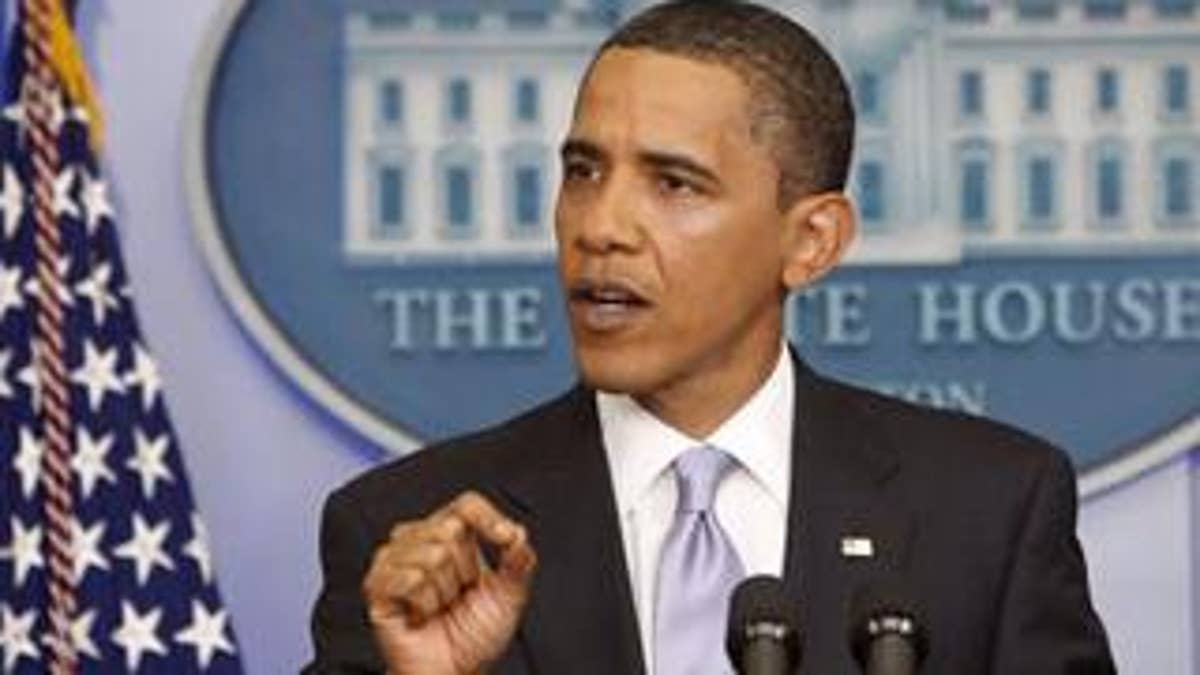
President Obama implored the Iranian regime Tuesday to pursue a "peaceful path" to resolve the election dispute that has thrown the country into chaos, saying it's "not too late" for the government to do so and engage with the international community.
Though some analysts see the protests on the streets of Iran as a potential tipping point that could eventually lead to the toppling of the regime, the U.S. president made clear that he's still interested in reviving diplomatic ties with the hard-line Islamic government.
Obama said the United States is "appalled and outraged" by the regime's crackdown on protesters, but that his administration is taking a wait-and-see attitude.
"What's happened in Iran is profound and we're still waiting to see how it plays itself out," Obama said at a press conference. "It's not too late for the Iranian government to recognize that there is a peaceful path that will lead to stability and legitimacy and prosperity for the Iranian people. We hope they take it." He said there remains a path for the country to engage with the global community.
Obama also dismissed concerns that he's not speaking out forcefully enough in support of the protesters, saying the Iranian people can "speak for themselves." At the same time, he used tougher language than he has in recent days.
"I strongly condemn these unjust actions, and I join with the American people in mourning each and every innocent life that is lost," he said. "But we must also bear witness to the courage and dignity of the Iranian people, and to a remarkable opening within Iranian society.
"This is not about the United States and the West. This is about the people of Iran, and the future that they, and only they, will choose," Obama said.
He pushed back on GOP criticism from Congress as well as criticism in the media, saying he has a presidential responsibility to ensure security and that he's not on a "24-hour news cycle."
At least 17 people have been killed in the protests. Obama specifically acknowledged the apparent shooting death of Neda Agha Soltan, an Iranian woman who in death has become a symbol for protesters in Iran -- the president called the video of the apparent killing "heartbreaking."
He said there are serious questions about the legitimacy of the presidential election, in which Mahmoud Ahmadinejad was declared the winner. But Obama noted the United States did not have observers on the ground and cannot "definitively" substantiate claims of fraud.
The president has since taking office tried to reach out to Iran, in a bid to engage the regime and reverse its alleged pursuit of nuclear weapons and support of terrorist groups. Some analysts, and even officials in the administration, see the turmoil in Iran as a major setback for those aims, though Obama indicated the government still has an opening to hit the reset button.
Obama scheduled his fourth White House press conference at a critical juncture in his young presidency.
Not only was he facing mounting pressure from the GOP to toughen his measured response to the turmoil in Iran, but his party is struggling to build consensus for a comprehensive health care reform. Polls also show Obama's approval ratings, and confidence in his signature economic stimulus program, slipping.
The president on Tuesday pushed Congress to address health care reform, and insisted that the final plan would not add to the deficit.
The White House argues that Obama is striking just the right tone on Iran -- and that to voice support too forcefully for the protesters would play right into the regime's hands.
"He'll continue to speak out in support of those that are seeking to demonstrate and do so in a way peacefully," White House press secretary Robert Gibbs told FOX News Tuesday ahead of the press conference. "We don't want to inject our government in the place of the reformers in this equation."
Obama does not want the U.S. to become a "political football" or "foil" to the demonstrators who are protesting Iran's disputed election outcome, said Gibbs.
But the White House left open the possibility Tuesday that it would intervene should the violence in Tehran escalate.
"Obviously if a tremendous escalation happens -- if tanks happen -- we would respond to that immediately," Gibbs said.












































